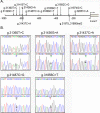Identification and functional study of GATA4 gene regulatory variants in atrial septal defects
- PMID: 34193080
- PMCID: PMC8243876
- DOI: 10.1186/s12872-021-02136-w
Identification and functional study of GATA4 gene regulatory variants in atrial septal defects
Abstract
Background: Congenital heart disease (CHD) is the leading cause of mortality from birth defects. In adult CHD patients with successful surgical repair, cardiac complications including heart failure develop at late stage, likely due to genetic causes. To date, many mutations in cardiac developmental genes have been associated with CHD. Recently, regulatory variants in genes have been linked to many human diseases. Although mutations and splicing variants in GATA4 gene have been reported in CHD patients, few regulatory variants of GATA4 gene are identified in CHD patients.
Methods: GATA4 gene regulatory region was investigated in the patients with atrial septal defects (ASD) (n = 332) and ethnic-matched controls (n = 336).
Results: Five heterozygous regulatory variants including four SNPs [g.31360 T>C (rs372004083), g.31436G>A, g.31437C>A (rs769262495), g.31487C>G (rs1053351749) and g.31856C>T (rs1385460518)] were only identified in ASD patients. Functional analysis indicated that the regulatory variants significantly affected the transcriptional activity of GATA4 gene promoter. Furthermore, two of the five regulatory variants have evidently effected on transcription factor binding sites.
Conclusions: Our data suggested that GATA4 gene regulatory variants may confer ASD susceptibility by decreasing GATA4 levels.
Keywords: Atrial septal defects; GATA4; Genetics; Promoter; Regulatory variants.
Conflict of interest statement
The authors declare that they have no competing interests.
Figures



Similar articles
-
Genetic analysis of the promoter region of the GATA4 gene in patients with ventricular septal defects.Transl Res. 2012 May;159(5):376-82. doi: 10.1016/j.trsl.2011.10.012. Epub 2011 Nov 23. Transl Res. 2012. PMID: 22500510
-
A mutation in the Kozak sequence of GATA4 hampers translation in a family with atrial septal defects.Am J Med Genet A. 2014 Nov;164A(11):2732-8. doi: 10.1002/ajmg.a.36703. Epub 2014 Aug 5. Am J Med Genet A. 2014. PMID: 25099673
-
Sequence variations in GATA4 and CITED2 gene among patients with cardiac septation defects from Xinjiang, China.Cardiol Young. 2024 Jul;34(7):1506-1513. doi: 10.1017/S1047951124000192. Epub 2024 Mar 8. Cardiol Young. 2024. PMID: 38456293
-
Congenital heart diseases and their association with the variant distribution features on susceptibility genes.Clin Genet. 2017 Mar;91(3):349-354. doi: 10.1111/cge.12835. Epub 2016 Sep 5. Clin Genet. 2017. PMID: 27426723 Review.
-
Associations of GATA4 genetic mutations with the risk of congenital heart disease: A meta-analysis.Medicine (Baltimore). 2017 May;96(18):e6857. doi: 10.1097/MD.0000000000006857. Medicine (Baltimore). 2017. PMID: 28471988 Free PMC article. Review.
Cited by
-
Identification and functional characterisation of DNA methylation differences between East- and West-originating Finns.Epigenetics. 2024 Dec;19(1):2397297. doi: 10.1080/15592294.2024.2397297. Epub 2024 Sep 1. Epigenetics. 2024. PMID: 39217505 Free PMC article.
-
Exploring the role of non-coding RNAs in atrial septal defect pathogenesis: A systematic review.PLoS One. 2024 Aug 22;19(8):e0306576. doi: 10.1371/journal.pone.0306576. eCollection 2024. PLoS One. 2024. PMID: 39172906 Free PMC article.
-
Novel and deleterious nucleotide variations in the HAND1 gene probably affect miRNA target sites and protein function in pediatric patients with congenital heart disease.Mol Biol Rep. 2024 Mar 29;51(1):468. doi: 10.1007/s11033-024-09410-y. Mol Biol Rep. 2024. PMID: 38551686
-
RNA binding proteins in cardiovascular development and disease.Curr Top Dev Biol. 2024;156:51-119. doi: 10.1016/bs.ctdb.2024.01.007. Epub 2024 Mar 15. Curr Top Dev Biol. 2024. PMID: 38556427 Free PMC article.
-
DNA damage-associated protein co-expression network in cardiomyocytes informs on tolerance to genetic variation and disease.bioRxiv [Preprint]. 2024 Aug 14:2024.08.14.607863. doi: 10.1101/2024.08.14.607863. bioRxiv. 2024. Update in: iScience. 2025 Apr 18;28(5):112474. doi: 10.1016/j.isci.2025.112474. PMID: 39185220 Free PMC article. Updated. Preprint.
References
-
- Pierpont ME, Brueckner M, Chung WK, Garg V, Lacro RV, McGuire AL, Mital S, Priest JR, Pu WT, Roberts A, Ware SM, Gelb BD, Russell MW; American Heart Association Council on Cardiovascular Disease in the Young; Council on Cardiovascular and Stroke Nursing; and Council on Genomic and Precision Medicine. Genetic basis for congenital heart disease: revisited: a scientific statement from the American Heart Association. Circulation 2018;138:e653–e711. - PMC - PubMed
Publication types
MeSH terms
Substances
LinkOut - more resources
Full Text Sources

